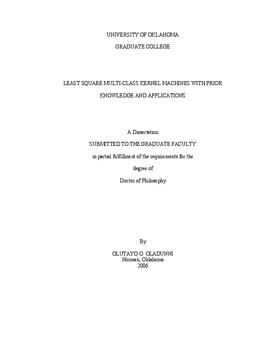| dc.contributor.advisor | Trafalis, Theodore B., | en_US |
| dc.contributor.author | Oladunni, Olutayo O. | en_US |
| dc.date.accessioned | 2013-08-16T12:20:02Z | |
| dc.date.available | 2013-08-16T12:20:02Z | |
| dc.date.issued | 2006 | en_US |
| dc.identifier.uri | https://hdl.handle.net/11244/986 | |
| dc.description.abstract | In this study, the problem of discriminating between objects of two or more classes with (or without) prior knowledge is investigated. We present how a two-class discrimination model with or without prior knowledge can be extended to the case of multi-categorical discrimination with or without prior knowledge. The prior knowledge of interest is in the form of multiple polyhedral sets belonging to one or more categories, classes, or labels, and it is introduced as additional constraints into a classification model formulation. The solution of the knowledge-based support vector machine (KBSVM) model for two-class discrimination is characterized by a linear programming (LP) problem, and this is due to the specific norm (L1 or Linfinity) that is used to compute the distance between the two classes. We propose solutions to classification problems expressed as a single unconstrained optimization problem with (or without) prior knowledge via a regularized least square cost function in order to obtain a linear system of equations in input space and/or dual space induced by a kernel function that can be solved using matrix methods or iterative methods. Advantages of this formulation include the explicit expressions for the classification weights of the classifier(s); its ability to incorporate and handle prior knowledge directly to the classifiers; its ability to incorporate several classes in a single formulation and provide fast solutions to the optimal classification weights for multicategorical separation. | en_US |
| dc.description.abstract | Comparisons with other learning techniques such as the least square SVM & MSVM developed by Suykens & Vandewalle (1999b & 1999c), and the knowledge-based SVM developed by Fung et al. (2002) indicate that the regularized least square methods are more efficient in terms of misclassification testing error and computational time. | en_US |
| dc.format.extent | xv, 164 leaves : | en_US |
| dc.subject | Linear programming. | en_US |
| dc.subject | Least squares Computer programs. | en_US |
| dc.subject | Machine learning. | en_US |
| dc.subject | Engineering, Industrial. | en_US |
| dc.title | Least square multi-class kernel machines with prior knowledge and applications. | en_US |
| dc.type | Thesis | en_US |
| dc.thesis.degree | Ph.D. | en_US |
| dc.thesis.degreeDiscipline | School of Industrial and Systems Engineering | en_US |
| dc.note | Source: Dissertation Abstracts International, Volume: 67-01, Section: B, page: 0473. | en_US |
| dc.note | Adviser: Theodore B. Trafalis. | en_US |
| ou.identifier | (UMI)AAI3207058 | en_US |
| ou.group | College of Engineering::School of Industrial and Systems Engineering | |
